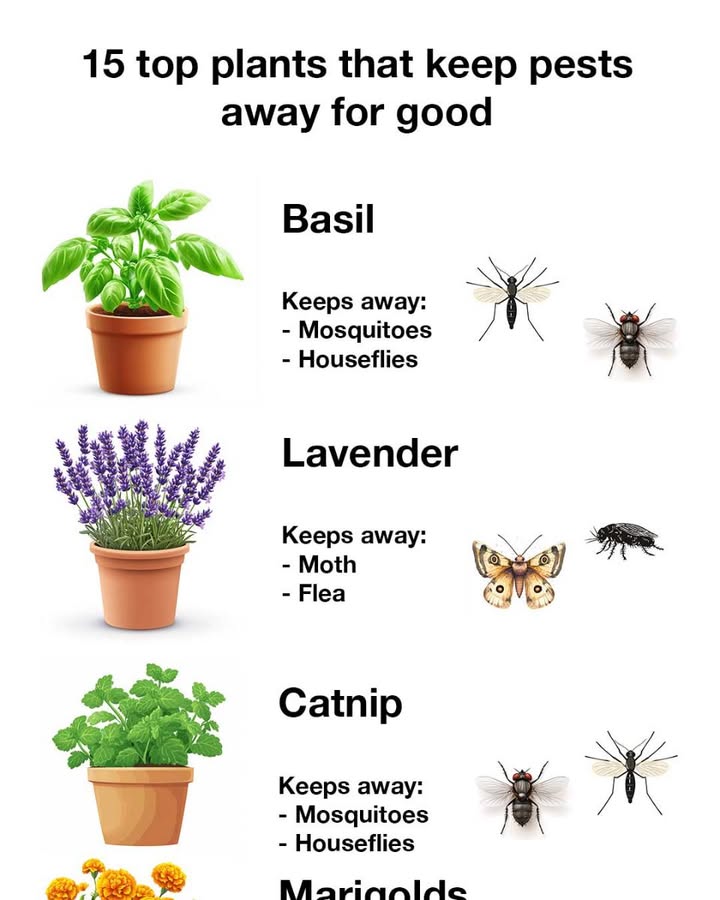1. Basil: The Mosquito and Housefly Deterrent
Basil is not only a culinary favorite but also an effective pest repellent. Its strong aroma is known to deter mosquitoes and houseflies. Planting basil near doorways or windows can help keep these pests from entering your home. Additionally, basil can be used in homemade sprays to enhance its repellent properties.
2. Lavender: A Natural Moth and Flea Repellent
Lavender is renowned for its soothing scent, which is pleasant to humans but repulsive to moths and fleas. Placing dried lavender sachets in closets can help protect clothes from moth damage. In the garden, lavender can be planted to create a fragrant barrier against fleas and other insects.
3. Catnip: Effective Against Houseflies and Mosquitoes
Catnip is famous for its effect on cats, but it is also a powerful mosquito and housefly repellent. Studies have shown that catnip oil is more effective than some commercial insect repellents. Planting catnip in your garden can help reduce the presence of these pests.
4. Marigolds: Protecting Against Aphids and Mosquitoes
Marigolds are a popular choice for gardeners due to their vibrant colors and pest-repelling properties. They release a scent that deters aphids, mosquitoes, and even nematodes. Planting marigolds around vegetable gardens can help protect crops from these common pests.
5. Rosemary: A Barrier for Mosquitoes and Cabbage Moths
Rosemary is a versatile herb that not only enhances culinary dishes but also acts as a natural pest repellent. Its woody scent is known to repel mosquitoes and cabbage moths. Rosemary can be planted in pots or garden beds to create a fragrant barrier against these insects.
6. Peppermint: Repelling Ants and Spiders
Peppermint is a refreshing herb that is effective at repelling ants and spiders. Its strong menthol scent confuses these pests and deters them from entering homes. Planting peppermint around the perimeter of your home or using peppermint oil sprays can help keep these unwanted visitors at bay.
7. Chrysanthemums: Natural Insecticide for Roaches and Fleas
Chrysanthemums contain pyrethrum, a natural insecticide that is effective against roaches, fleas, and other insects. The flowers can be used to make natural insecticidal sprays. Planting chrysanthemums in your garden can help reduce the population of these pests.
8. Lemongrass: Mosquito Repellent with a Citrus Scent
Lemongrass is a tropical plant known for its citrus scent, which is highly effective at repelling mosquitoes. The plant contains citronella, a common ingredient in mosquito repellents. Planting lemongrass in your garden or using its essential oil can help keep mosquitoes at bay.
9. Sage: Keeping Away Cabbage Moths and Carrot Flies
Sage is an aromatic herb that can deter cabbage moths and carrot flies. Its strong scent confuses these pests, making it difficult for them to locate their host plants. Sage can be planted alongside vegetables to protect them from these common garden pests.
10. Petunias: Defense Against Aphids and Tomato Hornworms
Petunias are not only beautiful but also serve as a natural defense against aphids, tomato hornworms, and other pests. They release a chemical that repels these insects, making them an excellent companion plant for vegetable gardens.
11. Garlic: A Shield Against Mosquitoes and Beetles

15 top plants that keep pests away
Gardening enthusiasts and homeowners alike are constantly on the lookout for natural ways to keep pests at bay. While chemical pesticides can be effective, they often come with unwanted side effects for the environment and human health. Fortunately, nature provides a variety of plants that can help deter pests naturally. These plants not only add beauty and fragrance to your garden but also serve as a natural defense against unwanted insects. This article explores 15 top plants that are known for their pest-repelling properties.
Understanding How Plants Repel Pests
Plants have evolved various mechanisms to protect themselves from pests. Some plants emit strong scents that confuse or repel insects, while others produce oils or compounds that are toxic to certain pests. Additionally, some plants attract beneficial insects that prey on harmful pests, creating a natural balance in the garden ecosystem. Understanding these mechanisms can help gardeners strategically place these plants to maximize their pest-repelling benefits.
